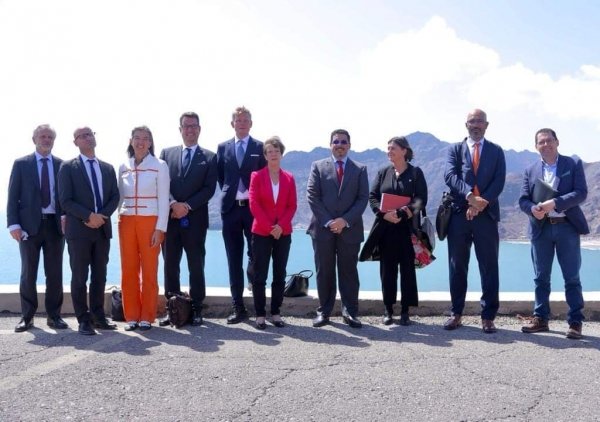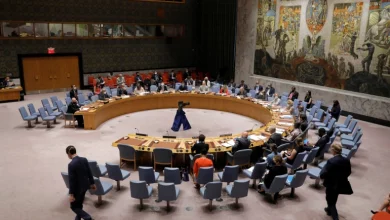EU delegation in Aden expresses support for government push for peace

SMA NEWS – ADEN THE CAPITAL
Several European ambassadors to Yemen visited the southern port of Aden, the interim capital of the country, on Saturday as Yemeni officials reported that the Houthis were raising obstacles during the prisoner swap talks in Amman.
The ambassador of the EU and ambassadors of France, Germany, France, the Netherlands, Belgium, Sweden, Ireland and Finland, as well as the deputy ambassador of Norway, landed in Aden, where they discussed peace efforts with senior government officials.
Ahmed Awad bin Mubarak, Yemen’s foreign minister, was quoted by the official media thanking the EU ambassadors for their visit to Aden that carries an “important political message” of support to the Yemeni government, adding that he discussed with the ambassadors the Riyadh Agreement, Houthi resistance to repairing the Safer tanker, the government’s efforts to restore services in the liberated provinces and the government willingness to reach a “real, comprehensive and lasting” peace in Yemen.
The EU delegation is the highest ranking group of foreign envoys to visit Aden since the arrival of Yemen’s new government, which was formed under the Riyadh Agreement.
The Yemeni government delegation in the prisoner swap talks in Amman said the talks encountered a stumbling block after the Iran-backed Houthis refused to swap abducted journalists and activists and seriously ill abductees.
“The Yemeni government delegation has offered concessions for the talks to succeed,” Majed Fadhail, deputy minister of human rights and a member of the government delegation in the talks, told Arab News on Saturday, adding that the Houthis have become more uncompromising and sought to obstruct the talks.
The Yemeni official attributed the Houthis’ new hardline behavior during talks to the US decision to reverse the designation of the Houthis as terrorists.
“Everyone must know that this criminal and terrorist militia refuses to release the remaining journalists in their detention or even consider swapping them with their fighters captured on the battlefields,” Fadhail said.
Representatives of the Yemeni government and the Houthis last month resumed UN-backed prisoner exchange talks with the aim of releasing 301 prisoners on both sides.
At the same time, the Abductees Mothers’ Association, an umbrella organization for thousands of relatives of abductees in Yemen, called for the urgent release of 127 extremely sick prisoners held by the Houthi militia and the Yemeni government.
Fadhail said the government delegation presented names of dozens of sick abductees among the Houthi prisoners and demanded their release during this round of talks. “We floated their names during the talks, but the Houthis refused to discuss releasing them,” Fadhail said.
In a social media campaign Yemeni activists, journalists and politicians demanded an end to Houthi crimes against Yemenis and criticized the US move to drop the terrorist designation of the Houthis.
Using the hashtag #StopHouthiTerrorismInYemen, dozens of Yemenis said that the Houthis have displaced thousands of people, abducted thousands more, blown up the houses of their opponents and carpeted the Yemeni land with tens of thousands of landmines.
Jamal Al-Mamari, a former abductee, reminded the new US administration in a tweet that the Houthis had tortured and killed an American contractor John Hamen, who died in Houthi custody in 2015
“For the Yemenis, the word Houthis means death, destruction, kidnapping, displacement, prisons, torture, diseases, starvation and rape,” said Mohammed Al-Asal, the deputy governor of Raymah province.
Yemeni activists also expressed opposition to any peace deal with the Houthis that does not punish them for human right abuses.
“Yemen does not want an incomplete peace with the Houthi militia who only believe in the language of exclusion, murder, torture, pillage and lack of equal citizenship. Our demand is a comprehensive and just peace, punishing the Houthis for all violations and crimes they committed and disarming them,” Huda Al-Sarari, a Yemeni lawyer and human rights activist who documents human right abuses in the southern city of Taiz.
The US administration should have used the terrorism designation of the Houthis as pressure to force them to stop obstructing the UN mission to repair the floating Safer tanker, Yemen experts said.
“By revoking Houthis designation unconditionally, the Biden administration made a huge mistake. It could have been used as leverage on the Houthis to deliver something in return — at least to allow engineers to empty the Safer. The US just lost that leverage for nothing,” said Nadwa Al-Dawsari, a Yemeni conflict analyst and a non-resident fellow at the Middle East Institute.







